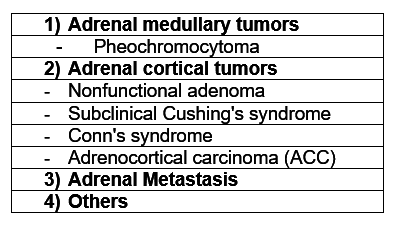Adrenal Tumors

Adrenal Tumors: Types, Characteristics, and Clinical Significance
Adrenal tumors arise from the adrenal glands, which are located atop the kidneys and consist of two main parts: the outer cortex and the inner medulla. These tumors vary widely in origin, hormone production, malignancy potential, and clinical impact.
Types of Adrenal Tumors
1. Adrenal Cortex Tumors
- Adrenal Adenomas (Incidentalomas):
- Most common adrenal tumors, usually benign and slow-growing.
- Often discovered incidentally during imaging for unrelated reasons.
- Can be non-functional or functional (hormone-producing).
- Functional adenomas may cause hormone excess syndromes such as:
- Cushing’s syndrome (excess cortisol)
- Conn syndrome (primary hyperaldosteronism) (excess aldosterone)
- Androgen or estrogen excess (less common).
- Adrenocortical Carcinomas (ACC):
- Rare but aggressive malignant tumors originating from the adrenal cortex.
- Can be functional (producing hormones like cortisol, aldosterone, androgens) or non-functional.
- Often diagnosed late due to rapid growth or hormone-related symptoms.
- Require prompt and aggressive treatment.
2. Adrenal Medulla Tumors
- Pheochromocytomas:
- Tumors of the adrenal medulla’s chromaffin cells producing excess catecholamines (epinephrine, norepinephrine).
- Cause symptoms like hypertension, headaches, sweating, palpitations, and anxiety.
- Mostly benign but a small percentage can be malignant.
- Sometimes occur bilaterally or as part of genetic syndromes (e.g., MEN2, von Hippel–Lindau).
- Neuroblastomas:
- Malignant tumors arising from immature nerve cells (neuroblasts) in the adrenal medulla.
- Primarily affect infants and young children.
- One of the most common pediatric cancers.
- Paragangliomas:
- Similar to pheochromocytomas but arise outside the adrenal gland in sympathetic or parasympathetic ganglia.
- Can produce catecholamines and cause similar symptoms.
- More likely to be malignant than pheochromocytomas.
Genetic and Risk Factors
Certain rare genetic syndromes increase the risk of adrenal tumors, including:
- Multiple Endocrine Neoplasia type 2 (MEN2)
- Von Hippel–Lindau syndrome
- Familial paraganglioma syndrome
- Neurofibromatosis type 1
- Carney complex
- Li–Fraumeni syndrome
Clinical Presentation
- Many adrenal tumors are asymptomatic and found incidentally.
- Functional tumors cause symptoms related to hormone excess:
- Hypertension, headaches, sweating (pheochromocytoma)
- Weight gain, muscle weakness, diabetes (Cushing’s syndrome)
- High blood pressure and low potassium (Conn syndrome)
- Large tumors may cause abdominal pain or fullness.
Diagnosis
- Hormonal evaluation: Blood and urine tests for cortisol, aldosterone, catecholamines, and androgens.
- Imaging: CT scan, MRI, and functional imaging (MIBG, PET) to characterize tumors and detect metastases.
- Biopsy: Rarely performed due to risk; diagnosis mainly based on imaging and hormone studies.
- Genetic testing: For patients with familial syndromes or bilateral/multifocal tumors.
Treatment
- Surgery: Primary treatment for most adrenal tumors, especially functional or malignant tumors.
- Medical management: For hormone excess (e.g., alpha-blockers before pheochromocytoma surgery, steroid replacement post-adrenalectomy).
- Chemotherapy and radiation: For advanced adrenocortical carcinoma or inoperable tumors.
- Surveillance: For small, non-functional incidentalomas without suspicious features.
Summary Table
| Tumor Type | Origin | Hormone Production | Malignancy Potential | Typical Patient Group |
|---|---|---|---|---|
| Adrenal Adenoma | Cortex | Usually none or cortisol/aldosterone | Benign | Adults, incidental finding |
| Adrenocortical Carcinoma | Cortex | Cortisol, aldosterone, androgens | Malignant | Adults, aggressive |
| Pheochromocytoma | Medulla | Catecholamines (epinephrine, norepinephrine) | Mostly benign, some malignant | Adults, symptomatic |
| Neuroblastoma | Medulla | None or catecholamines | Malignant | Infants and young children |
| Paraganglioma | Extra-adrenal | Catecholamines | Higher malignancy risk | Adults |
Consult with Our Team of Experts Now!
At DrStemCellsThailand (DRSCT)‘s Anti-Aging and Regenerative Medicine Center of Thailand, we emphasize comprehensive evaluations and personalized treatment plans of Cellular Therapy and Stem Cells for managing various health conditions. If you have questions about Adrenal Tumors or would like more information on our services, consult with our experts today!
Consult with Our Team of Experts Now!
References
- NYU Langone Health: Types of Adrenal Tumors1
- Memorial Sloan Kettering Cancer Center: Types of Adrenal Tumors2
- Moffitt Cancer Center: Types of Adrenal Tumors3
- Canadian Cancer Society: Types of Adrenal Tumors4
- Cancer Center: Adrenal Cancer Types5
- American Cancer Society: Adrenal Cancer Overview6
- Radiopaedia: Adrenal Gland Tumours7
- MD Anderson Cancer Center: Adrenal Tumors8















